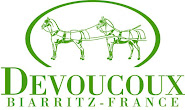A. It comes two-fold as a rider and a trainer and coach: to do the best I can with my horses and to give my students the most help that I can give. There are two sides to my life; there’s more to life than horses, so my family is very important to me. My family and my friends for sure. I have a husband, Peter Dean, and we live in Round Hill, Virgina. My parents are divorced but both remarried so I’m lucky to have four wonderful parents and they are some of my biggest fans and supporters. My Dad has been diagnosed with pancreatic cancer so it has been made more clear that every minute you can have with them is important.

photo by Emily Daily
Q. How did you come to Virginia:
A. I grew up in Vermont and when I graduated high school I took a year off to get horses out of my system. I worked with Jane Hamlin and she recommended riding with a bigger name so I went south for the winter to do horses full time for the first time in my life. I ended up with Wash Bishop and spent the winter in Ocala and loved the situation so much I followed him back to Middleburg in 1992. I went home to Vermont for a couple summers but ended up following Wash. I didn’t get horses out of my system; instead I got them more IN my system. After renting some barns here my family bought a farm to help me start a business. I’m luck to have that support. The rest is history. Or, I guess you could say, that history is still being made.
Q. Tell me about the farm:
A. I feel like [Middleburg] been so developed in the last ten or fifteen years, we were lucky to get the farm and land. We got one of the last open fox hunting areas. We have 65 acres. We originally bought 35 that had two houses on it but no paddocks, no barn, and no ring so we could do it all how we wanted it. The lot next to us came available and now we have 65 acres total with two huge fields and run-in sheds. And we’re lucky enough to have neighbors who have 100 acres they keep open for foxhunting which is all my conditioning land. I’m pretty lucky. Kelli and Rich Temple bought the land behind us and developed a beautiful facility so we can share and that works well. I’m lucky.
Q. What’s it like on the farm?
A. It changes. For a professional I never have a huge number of horses or students. I’m a very private person and I do like my space. Most of the time the stalls are filled and I have a couple students who board and are on the program; the rest ship in and out. Some days it’s full of trailers and I’m teaching lesson to lesson to lesson and riding all the horses and other days it’s just me and my horses and a wonderful girl who works for me.
Q. Is there anything that you just can’t stand?
A. I certainly have my likes and dislikes but I’m pretty easy going and pretty likeable. It takes a lot to get me angry or pissed off. Usually I’m pretty level-headed and do my best to keep everyone happy and keep everything on even, smooth keel. I don’t like it when animals are mistreated. I don’t like it when you see on the news when people have to go without food. Just human nature things.

photo by Emily Daily
Q. Do you remember the first time you thought about horses?
A. I was lucky enough that I grew up on a small farm and my mom had horses. I was surrounded by horses. There is a family photo of me at two years old and on my pony. My parents bought a racing saddle and that was my saddle. My mom and dad are holding on to each side. I was on my first pony at two, so I certainly grew up on a horse. My mom was not a competitor but always had horses so it was always normal life taking care of them. Since she rode I wanted to ride and I guess was bit by the bug more than her. As soon as I found where Huntington Farms was I wanted to be working student. I would go to the barn in the summer and stay all day.
Q. Were there other things that captured your imagination in the same way?
A. My parents were great in that they wanted me to experience things other than horses. I played basketball and growing up in Vermont skiing was huge so I got into downhill skiing. But I got to point where I wanted to spend more time with horses and backed away from the sport.
Q. Why do you 3-Day event?
A. I think because of Huntington Farm. They ran a bunch of events and being a working student I would work and help put on events so got to see it. However, it was also a big dressage facility and Jane Savoi was based out of there and was one of my first instructors. I can’t say I saw eventing and had to do it. It’s more that’s what they did so that’s what I wanted to do and the more I did it the more I wanted to do it. After I went to my first event there was no question.

photo by Emily Daily
Q. What do you do to attend to your horse’s legs after you come off cross-country?
Ice is very important. As soon as my horse has reached preliminary they’re iced after cross-country if not after a gallop too. To varying degrees if have they have sore feet they’re iced in boot or bucket, if they don’t have foot issues then they’re iced in an ice boot. They are always wrapped. I poultice after cross-country but if they have skin sensitivity I use linements. I wrap after hard work to support them but I don’t go crazy with it. I don’t wrap them every night. After hard work they need the support. My young horses, like the prelim horses, go out at night so they get iced and wrapped until it’s time to go out. It’s better to go out and get circulation.
Q. Turnout is a big deal at competitions (and at home!). What is always a must for you?
A. I think it’s changed a little bit as I’ve gotten busier and have more horses. Wash [Bishop] was meticulous and there was hoof polish every time they left the stall and tail wraps on as we were grooming so they always looked perfect. I would love do to that however there’s not enough time or hands. I certainly like them to be clean and dirt-free. It drives me crazy when their manes don’t lay over. To fix that depends on the horse. For some it’s easy to braid and they lay over. I have some Irish ponies where braids don’t work. A wet towel laying over their mane while grooming is helpful. Hoods are also helpful; slinkies I call them. I put those on after they get braided and that helps everything lie flat. So manes and also keepers falling off the bridles. I hate to get on a horse and have keepers flapping. All the people who work for me learn that quickly!
Just want to throw a shout out to Emily Daily at the USEA for these wonderful photographs. Did you notice that they were ALL hers? She's a dynamic photographer, engaging writer, and wonderful person and we are lucky that she's at the USEA. Thanks Emily! Check back for Part II of Mara Dean's interview and the inside info on her horses (including Nicki Henley, letting go to gain control, and life off the back of a horse. If you're gunning for more on Mara this very instant check out her interview with our friends at The Eventing Radio Show.









No comments:
Post a Comment